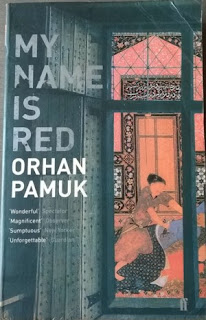“In Istanbul, in the late 1590s, the Sultan secretly commissions a
great book: a celebration of his life and his empire, to be illuminated
by the best artists of the day — in the European manner. But when one
of the miniaturists is murdered, their master has to seek outside help.
Did the dead painter fall victim to professional rivalry, romantic
jealousy or religious terror?”

So
the summary goes on the back page. It appeared that at the time,
painting in Istanbul was influenced by Chinese and Persian ideas, with
beautiful ladies being painted white with slanted eyes. Rather than the
head artist of his palace, the Sultan commissioned an outsider, Enishte,
to create the great book, and he in turn hires the artists individually
from the palace and got them to work on different sections of each page
at a time, not knowing what the others had done. The so-called
“European manner” is painting in such a way that the object is
represented as realistically as possible, so that it would be possible
to identify the painted object just by looking at the painting. This
idea seemed to go against the Islamic dictates at the time, or so some
felt, because instead of Allah people would be tempted to worship the
painted images. Another aspect of the European manner was perspectivism,
showing things in the distance smaller. The accepted way of presenting
objects in paintings at the time was to show them relative to their
religious importance, so that only Allah was supposed to occupy center
stage.
When Elegant, one of the painters, realizes that the book they were
creating would go against the accepted religious norms, he gets frantic
and worried to the point of alerting a radical sect. His fellow
colleague then murders him to stop him, when they were alone. And not
only this, the murderer also goes on to kill Enishte in a fit of rage,
partly for his readiness to accept the European methods. The rest of the
tale is about the unmasking of this one murderer on one hand, and a
love affair between Shekure, the daughter of Enishte, and Black, a
one-time artist under Enishte’s care whom he banished on learning that
he was in love with his daughter.
There are quite a number of notable things about this novel. The
narrative style is one: Each chapter presents a different character
telling the story from his or her own point of view. Not only living
people, but also the dead and animals, and ideas like Satan and the
color Red. It appears the Turkish tradition was that each man’s name
bore the suffix
Effendi. So we see Enishte Effendi, Black
Effendi, Elegant Effendi, and so on. Then there is the practice of
homosexuality. With women carefully hidden away, beautiful boys were
seen as good replacement for sex: Masters falling in love and fondling
their beautiful male apprentices; the visits of men to beautiful male
prostitutes for oral sex; even anal sex was not left out. And it all
seemed acceptable in the society. Towards the end before the killer was
finally sent running, there was open display of affection and kissing
between the artists.
At the end, all appeared to have been resolved, with the exception of
the completion of the Sultan’s book. The murderer was not only
discovered, but Shekure’s hastily arranged marriage to Black was no
longer threatened by her former husband’s brother Hasan. Hasan it was
who beheaded the murderer, but he fled the city perhaps for mistaking
the murderer for Black.
















